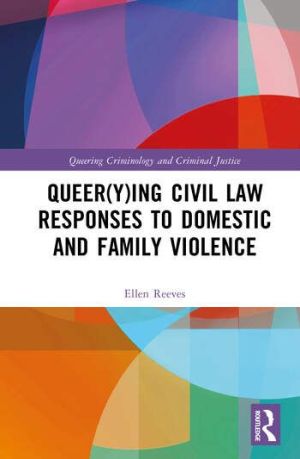
Queer(y)ing Civil Law Responses to Domestic and Family Violence offers unique, in-depth insights into the experiences of LGBTQ+ victim-survivors who have engaged with civil protection order systems.
Drawing on data from an Australian study following the experiences of LGBTQ+ victim-survivors of domestic and family violence who engaged with Victoria’s civil protection order system, this book adopts a feminist, queer, and trans abolitionist perspective to challenge the assumption that the best response to LGBTQ+ domestic and family violence is a legal one. Problematizing responses that fundamentally require increased investment in policing, courts, and prisons despite the risks this poses to marginalized individuals and communities, this book centres queer criminology as a framework through which we can situate and critique the rigid victim/perpetrator binaries that are so characteristic of legal responses to violence. This same criminological framework also provides the tools and knowledge needed to envision an alternative, community-orientated response to harm—within and beyond queer communities. In this way, the book presents queer criminology not only as a way of understanding LGBTQ+ experiences, but also as a means for analyzing the broader shortcomings of a system that more often exacerbates risk of harm than minimizes it.
Queer(y)ing Civil Law Responses to Domestic and Family Violence will be useful for students and scholars of LGBTQ+ violence, as well as a valuable resource for policy makers, legal and specialist practitioners and advocates considering how best to respond to LGBTQ+ domestic and family violence.